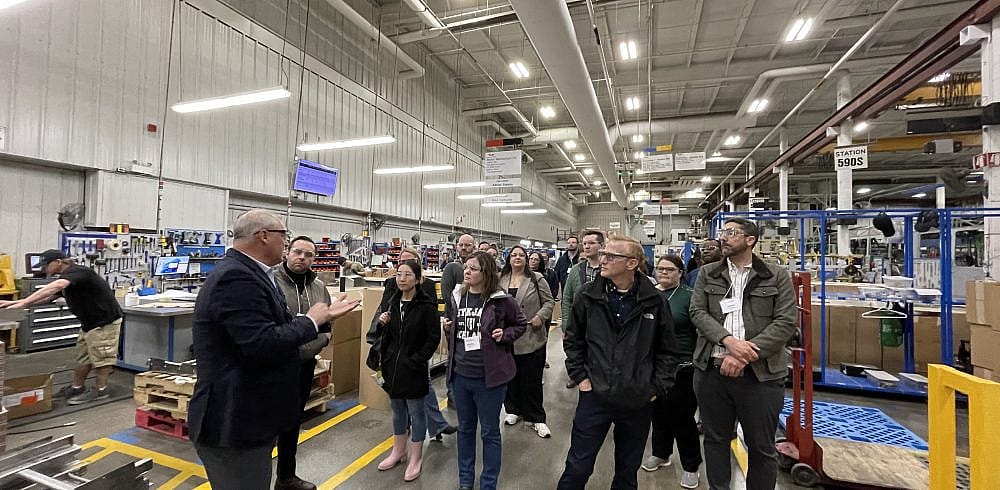5- minute read
In this Q&A with Michael Barkman, Manitoba Network Manager at CCEDNet, we dive into the important ideas of economic justice and reconciliation in their work. Discover how CCEDNet, since starting in 1999, has made a difference in community economic development in Manitoba and nationally. The conversation explores what economic justice means, how it aligns with reconciliation, and offers practical tips for using our purchasing power for good during the holidays and throughout the year.
Winnipeg Chamber (WCC): How did CCEDNET originate, and what inspired its formation?
 Michael Barkman (MB): CCEDNet, the Canadian Community Economic Development Network, emerged on the national stage in 1999. This collective effort was fueled by a shared belief that economic and social development is most impactful when led by the people within their own communities. Emphasizing principles of local ownership, control, and democratic development, CCEDNet’s formation was inspired by the vision that networking among practitioners could fortify their collective impact, propelling the movement both nationally and, notably, locally in Manitoba.
Michael Barkman (MB): CCEDNet, the Canadian Community Economic Development Network, emerged on the national stage in 1999. This collective effort was fueled by a shared belief that economic and social development is most impactful when led by the people within their own communities. Emphasizing principles of local ownership, control, and democratic development, CCEDNet’s formation was inspired by the vision that networking among practitioners could fortify their collective impact, propelling the movement both nationally and, notably, locally in Manitoba.
Manitoba stands as a testament to CCEDNet’s influence in Community Economic Development, helping support innovative milestones along the way. The Neighbourhoods Alive program and the Neighborhood Renewal Corporation model are prime examples, where organizations with local boards receive government funding for strategic five-year plans addressing development needs. Another landmark achievement is Manitoba’s pioneering social enterprise strategy, setting a precedent for all of Canada. CCEDNet provided capacity, support, and ecosystem development for these initiatives and others, such as championing the concept of social procurement.
WCC: What does the concept of economic justice mean, and how does CCEDNet interpret it in its work?
 MB: Economic justice revolves around ensuring the fair distribution of resources and opportunities. CCEDNet sees economic justice as a means of addressing historical imbalances, particularly those stemming from systems like colonization. In practical terms, CCEDNet advances economic justice through the practice of community economic development, with a focus on enterprises and organizations that prioritize social missions.
MB: Economic justice revolves around ensuring the fair distribution of resources and opportunities. CCEDNet sees economic justice as a means of addressing historical imbalances, particularly those stemming from systems like colonization. In practical terms, CCEDNet advances economic justice through the practice of community economic development, with a focus on enterprises and organizations that prioritize social missions.
The emphasis is on a triple bottom line, where profit, people, and the planet are considered with equal importance.
By supporting non-profits, social enterprises, and cooperatives to embed their mission and impact into their daily operations, CCEDNet helps build toward a vision for economic justice: sustainable, equitable, and inclusive communities directing their own futures. Moreover, the network advocates for democratic control, ensuring that local communities have a meaningful say in economic development decisions. CCEDNet envisions community economies as sites of transformation toward sustainable financial empowerment and community development. CCEDNet connects people and ideas for action to build local economies that strengthen communities and benefit everyone.
WCC: How does the work that CCEDNet does help advance reconciliation or embody the calls to action, especially in the context of procurement and the TRC calls to action?
MB: CCEDNet’s approach to community economic development is deeply rooted in the wisdom and leadership of Indigenous elders, leaders, enterprises, and organizations. The Neechi principles, based on international coop models and the 7 Sacred Teachings of the Anishinaabe people, have underpinned CCEDNet’s for the past 20+ years. The Neechi principles were developed by Neechi Commons, an Indigenous-led worker cooperative in Winnipeg’s North End. The principles helped form the entire provincial community economic development framework in Manitoba. These principles are evident in numerous members of the Network, including social enterprises like Mother Earth Recycling and community-based organizations like Ka Ni Kanichihk.

CCEDNet’s economic approach and advocacy is rooted in the Neechi Principles, including a focus on ensuring government procurement achieves positive community outcomes. Current CED priorities align with several Truth and Reconciliation Commission (TRC) Calls to Action, including Call to Action 92, which addresses the corporate sector. CCEDNet’s advocacy strives for systemic change and a profound transformation in economic models, values, and community-building. Indigenous-led social enterprises, non-profits, and cooperatives are leading the way for what economic reconciliation looks like here in Winnipeg. CCEDNet has benefited from the participation and leadership of many local Indigenous leaders who have shaped our Network, approach, and have been friends and teachers.
WCC: In line with your emphasis on community economic development, what steps can individuals and businesses take during the holiday season to make well-informed decisions that consider the impact on communities and the environment? Why is this important?
 MB: Making well-informed decisions during the holiday season is crucial for individuals and businesses looking to contribute to community economic development, considering environmental, social, and economic impacts. CCEDNet encourages a thoughtful approach, recognizing that achieving perfection may not always be feasible, but progress is essential. For businesses, engaging with social enterprises, non-profits, and community leaders can provide valuable insights into making impactful choices not just around the holiday season, but all year round. Collaborative problem-solving sessions can lead to innovative solutions that align with community values.
MB: Making well-informed decisions during the holiday season is crucial for individuals and businesses looking to contribute to community economic development, considering environmental, social, and economic impacts. CCEDNet encourages a thoughtful approach, recognizing that achieving perfection may not always be feasible, but progress is essential. For businesses, engaging with social enterprises, non-profits, and community leaders can provide valuable insights into making impactful choices not just around the holiday season, but all year round. Collaborative problem-solving sessions can lead to innovative solutions that align with community values.
Individuals are urged to be mindful of their purchases, understanding the impact each decision has on the local economy.
Our purchasing can have a lot of power to impact our community. Shifts in purchasing behavior, such as supporting social enterprises or considering community benefits in your supply chain, can contribute to positive change.
During tough economic times, businesses and individuals are encouraged to focus on practical, achievable steps rather than striving for perfection. The emphasis is on making purchases that support social good, community economic development, and climate resilience. CCEDNet recommends exploring local resources like social enterprise lists through Buy Social Canada or supporting Network member Local Investment Toward Employment (LITE).




